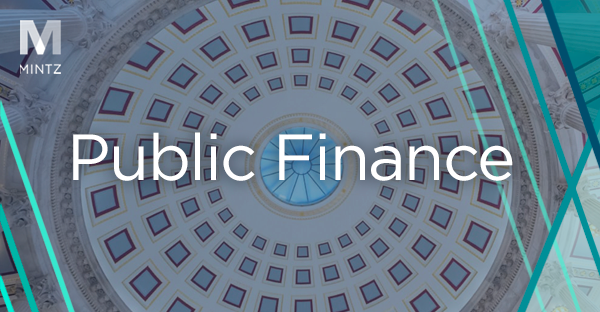
Bankruptcy & Restructuring
Viewpoints
Filter by:
Are Leveraged Loans Subject To Securities Laws? It Depends…
June 1, 2020 | Blog | By Eric Blythe
Leveraged loans continue to be a topic of interest in the current environment, particularly when they are pooled and securitized as collateralized loan obligations. A recent decision sheds light on whether and when leveraged loans and similar instruments may be classified as securities and, therefore, be subject to securities laws.
Read more
Delaware Bankruptcy Court Rules that Shareholder Cannot Enforce “Golden Share” Blocking Right to Dismiss Bankruptcy Filed Without its Consent
May 27, 2020 | Blog | By Tim McKeon
As the COVID-19 pandemic continues to disrupt businesses and markets, and companies begin to look to bankruptcy courts for relief from the resulting liquidity and operational distress, the issue of creditor and shareholder “blocking rights” seems likely to become an important topic as parties attempt to protect their investments.
Read more
Fraud Investigations and Complex Asset Recovery in 2020: A Q&A With Mintz Cross-Border Asset Recovery Co-Chairs Dan Pascucci and Joe Dunn
April 27, 2020 | Blog | By Joseph Dunn, Daniel Pascucci
With courts and government agencies around the world enacting emergency measures in response to the Covid-19 pandemic – ranging from complete shutdowns to delays and limitations – advancing the ball in dispute resolution is more challenging than ever.
Read more
First Circuit Issues Important Ruling on Valuing Secured Claims in Settled Causes of Action
April 22, 2020 | Blog | By Tim McKeon
In a recent decision addressing valuation issues, the First Circuit has issued an important reminder – and warning – to creditors seeking to establish a secured claim in settlement proceeds based on a security interest in the settled claim. In short, the key lesson for would-be secured creditors is this – the value of a claim is not equal to the value of damages!
Read more
Small Business Chapter 11 Eligibility Expanded Under CARES Act
April 2, 2020 | Blog
President Trump signed the Small Business Reorganization Act of 2019 (the “SBRA”) into law in August of last year and it became effective on February 20, 2020. The SBRA amended the U.S. Bankruptcy Code and is designed to simplify and shorten the reorganization process for “small businesses” and to make the entire process more cost effective.
Read more
The Coronavirus Aid, Relief, and Economic Security Act: Assistance Available to Passenger Airlines and Airports
March 31, 2020 | Blog | By Tim McKeon, William Kannel
On March 27, 2020, President Trump signed into law the “Coronavirus Aid, Relief, and Economic Security Act” (the “CARES Act”), a $2+ trillion stimulus package intended to ease the economic and social disruptions facing the country in the wake of the COVID-19 outbreak.
Read more
Congress Acts to Mitigate COVID-19 Impact
March 18, 2020 | Blog | By Anthony DeMaio, William Kannel
Below is an update on legislative efforts by Congress and the White House to address the coronavirus pandemic, prepared by our D.C. colleagues at ML Strategies, who are closely following these fluid and fast-moving developments. Efforts to provide a supply of low cost working capital to the many businesses and entities experiencing operational and/or cash flow disruption may be of particular interest to our bondholder clients.
Read more
Are Bankruptcy Blocking Provisions in Corporate Governance Documents Enforceable?
October 24, 2019 | Blog
Many equity sponsors are both shareholders and lenders to their portfolio companies. In that hybrid case, where the shareholder is also a creditor, can the shareholder enforce corporate governance provisions which restrict the ability of the company to file for bankruptcy? A recent decision from the Fifth Circuit Court of Appeals has answered that question in the affirmative - with caveats.
Read more
THE FIFTH CIRCUIT ADOPTS AN EXPANSIVE READING OF SECTION 510(b); SUBORDINATES CLAIM WITH ‘EQUITY CHARACTERISTICS’
October 1, 2019 | Blog | By Andrew B. Levin
In French v. Linn Energy, L.L.C. (In re Linn Energy, L.L.C.), the United States Court of Appeals for the Fifth Circuit addressed the scope of Bankruptcy Code Section 510(b), settling on an expansive reading of the Section, holding that a claim for “deemed dividends” should be subordinated.
Read more
The Risks of Imperfect Perfection, and How to Avoid Them
September 25, 2019 | Blog
Changes to Preference Practices Under New Bankruptcy Law
September 4, 2019 | Blog | By Tim McKeon
Decade Old Transactions Potentially Subject to Bankruptcy Clawback in Massachusetts
August 15, 2019 | Blog | By Eric Blythe
Transfers and transactions up to ten years old may be scrutinized, unwound and recovered by a trustee, the bankruptcy court sitting in Massachusetts recently held in the NECCO (think chalky wafer candy) bankruptcy case. The ruling, in a case of first impression in Massachusetts, expands the reach back period from the typical four-year period for fraudulent transfer recovery, so long as the IRS is a creditor in the case.
Read more
Supreme Court Adopts a “Rejection-as-Breach” Rule to Allow Licensee to Continue to Use Trademark Following Debtor’s Rejection of License
May 29, 2019 | Blog | By Tim McKeon
On May 20, 2019, the United States Supreme Court ruled that a debtor-licensor’s ‘rejection’ of a trademark license agreement under section 365 of the Bankruptcy Code does not terminate the licensee’s rights to continue to use the trademark. The decision, issued in Mission Product Holdings, Inc. v. Tempnology, LLC, resolved a split among the Circuits, but may spawn additional issues regarding non-debtor contractual rights in bankruptcy.
Read more
Health Care Fraud Investigations and Litigation Offer Unexpected Lessons for Bankruptcy Counsel
April 25, 2019 | Blog | By Samantha Kingsbury
As many of our readers know, we have been closely following the Polukoff False Claims Act (FCA) qui tam case in the Tenth Circuit for the lessons it might offer in defending FCA cases premised on allegations related to lack of medical necessity (among other topics). Recently, we had the opportunity to consider this case from a different angle: the lessons it might offer to bankruptcy counsel advising clients who are or have been the subject of a health care fraud investigation and/or FCA qui tam case.
Read more
First Circuit Rules That “Incorporation by Reference” of Collateral Description in UCC Financing Statements May Not Perfect Lien
February 14, 2019 | Blog | By William Kannel, Eric Blythe
Tolstoy warned that “if you look for perfection, you’ll never be content”; but Tolstoy wasn’t a bankruptcy lawyer. In the world of secured lending, perfection is paramount. A secured lender that has not properly perfected its lien can lose its collateral and end up with unsecured status if its borrower files bankruptcy.
Read more
The Delaware Bankruptcy Court Grapples With Section 546(e) Post-Merit Management
January 18, 2019 | Blog | By Andrew B. Levin
In its ruling in FTI Consulting, Inc. v. Sweeney (In re Centaur, LLC), the United States Bankruptcy Court for the District of Delaware addressed the Supreme Court’s recent clarification of the scope of Bankruptcy Code Section 546(e)’s “safe harbor” provision, affirming a more narrow interpretation of Section 546(e).
Read more
Supreme Court to Decide Whether Debtors Can Terminate a Licensee’s Rights to Trademarks under License Agreements
December 7, 2018 | Blog | By Tim McKeon
Ninth Circuit: No Ulterior Motive, No Bad Faith When Buying Claims to Block Confirmation
July 24, 2018 | Blog
A recent Ninth Circuit Court of Appeals decision provides insight into “bad faith” claims-buying activity; specifically whether a creditor’s purchase of claims for the express purpose of blocking plan confirmation is permissible.
Read more
Non-Debtor Substantive Consolidation: Do Recent Cases Signal a Judicial Preference for State Law Claims?
July 11, 2018 | Blog
It is not unusual for a creditor of a debtor to cry foul that a non-debtor affiliate has substantial assets, but has not joined the bankruptcy.
Read more
Supreme Court Bankruptcy Thoughts: Scope of Safe Harbor and Appellate Review
May 3, 2018 | Blog | By Sarah Ramuta
The Supreme Court recently addressed two bankruptcy issues. In its Merit Management opinion, the Court resolved a circuit split regarding the breadth of the safe harbor provision which protects certain transfers by financial institutions in connection with a securities contract.
Read more
Explore Other Viewpoints:
- Antitrust
- Appellate
- Arbitration, Mediation & Alternate Dispute Resolution
- Artificial Intelligence
- Awards
- Bankruptcy & Restructuring
- California Land Use
- Class Action
- Complex Commercial Litigation
- Construction
- Consumer Product Safety
- Cross-Border Asset Recovery
- Debt Financing
- Direct Investing (M&A)
- Diversity
- EB-5 Financing
- Education & Nonprofits
- Employment
- Energy & Sustainability
- Environmental Enforcement Defense
- Environmental Law
- FDA Regulatory
- Federal Circuit Appeals
- Financial Institution Litigation
- Government Law
- Growth Equity
- Health Care
- Health Care Compliance, Fraud and Abuse, & Regulatory Counseling
- Health Care Enforcement & Investigations
- Health Care Transactions
- Health Information Privacy & Security
- IP Due Diligence
- IPRs & Other Post Grant Proceedings
- Immigration
- Insolvency & Creditor Rights Litigation
- Institutional Investor Class Action Recovery
- Insurance & Financial Services
- Insurance Consulting & Risk Management
- Insurance and Reinsurance Problem-Solving & Dispute Resolution
- Intellectual Property
- Investment Funds
- Israel
- Licensing & Technology Transactions
- Life Sciences
- Litigation & Investigations
- M&A Litigation
- ML Strategies
- Medicare, Medicaid and Commercial Coverage & Reimbursement
- Mergers & Acquisitions
- Patent Litigation
- Patent Prosecution & Strategic Counseling
- Pharmacy Benefits and PBM Contracting
- Portfolio Companies
- Privacy & Cybersecurity
- Private Client
- Private Equity
- Pro Bono
- Products Liability & Complex Tort
- Projects & Infrastructure
- Public Finance
- Real Estate Litigation
- Real Estate Transactions
- Real Estate, Construction & Infrastructure
- Retail & Consumer Products
- Securities & Capital Markets
- Securities Litigation
- Special Purpose Acquisition Company (SPACs)
- Sports & Entertainment
- Strategic IP Monetization & Licensing
- Tax
- Technology
- Technology, Communications & Media
- Technology, Communications & Media Litigation
- Trade Secrets
- Trademark & Copyright
- Trademark Litigation
- Venture Capital & Emerging Companies
- White Collar Defense & Government Investigations
- Women's Health and Technology















